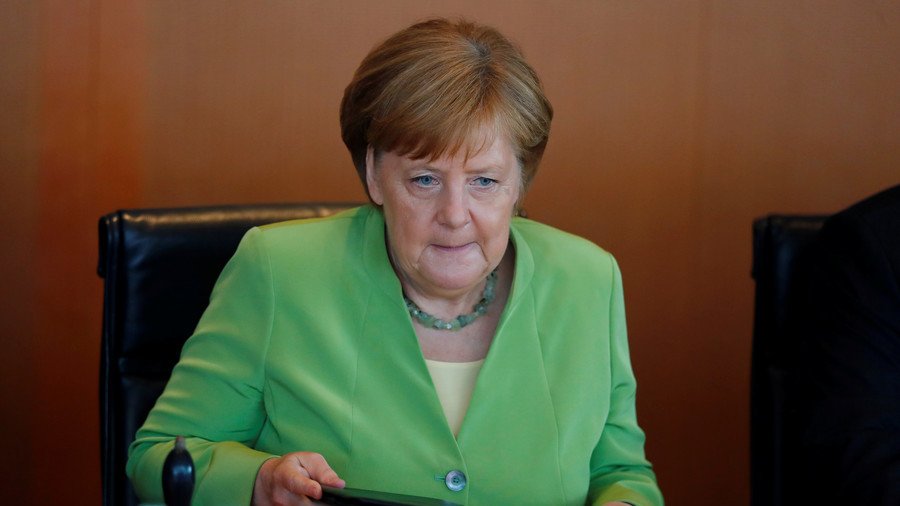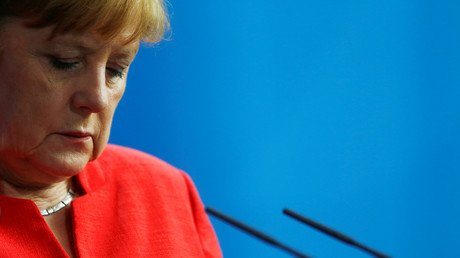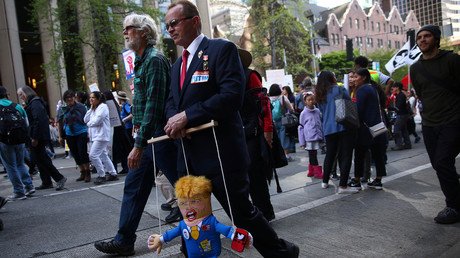Germans split on whether Merkel should remain chancellor, poll shows amid coalition feud

A new poll shows that some 43 percent of Germans believe that Chancellor Angela Merkel should step down. It comes amid fears that her rift with Bavaria over ‘open-door’ migrant policy may plunge the coalition into crisis.
A YouGov poll, which was conducted ahead of Sunday’s emergency EU meeting called by Merkel in an attempt to persuade other European leaders to stop migrants from moving freely within the EU borders, has shown that the German public is increasingly skeptical about Merkel’s ability to pull the plan through.
The meeting, which will take place in the run-up to the EU summit on June 28-29, was hastily scheduled by Merkel after the head of her Christian Democratic Union (CDU) sister party, Christian Social Union (CSU), publicly confronted her over her failure to tackle the migrant influx with a policy many believe is too lenient toward unwanted arrivals.
The majority of those polled, 43 percent, believe that it’s time for Merkel to vacate the post and hand over the reins to a successor. While that figure implies that nearly a half of Germans are dissatisfied with Merkel’s policy, the country is essentially divided about her role, as 42 percent still want to see the long-running leader at the helm of the government. The remaining 15 percent did not give an opinion on the issue.
Notably, the Chancellor commands more support, not from her own party, the CDU, but from the Green Party, according to the poll. Some 66 percent of the Green Party’s supporters back Merkel, while only 63 percent of the Christian Democrats approve of her performance.
CSU leader Horst Seehofer, who is also Germany’s Interior Minister, threatened to act unilaterally to enforce tougher migration rules – his so-called “master plan” – which reportedly includes turning asylum seekers who already applied for asylum in a different European nation away at the German border.
It was reported that Seehofer gave Merkel two weeks, up until the EU summit, to solve the issue. However, he later dismissed the reports, saying that it was Merkel who set the deadline.
While Seehofer insists that he does not want the coalition break up, he indicated that he won’t back down on his stance for the sheer sake of saving it from crumbling. The support he receives from fellow party members is “more important than any office,” he said in an interview to Passauer Neue Presse on Friday.
Seehofer urged Merkel against firing him, noting that it will be the first precedent when “looking after and taking care of the security and order of the country is the reason giving for firing a minister.”
“I am the leader of the CSU, one of the three coalition parties, and act with the full support of my party. If the chancellery is not satisfied with the interior minister's work, then the coalition should end,” he stressed.
Fears that the coalition may in fact collapse right now are still relatively low. Only one in three people, that is 32 percent of those polled, believe that the migration spat will topple Merkel's government, while 45 percent think that the allies can overcome the tumultuous period and stay together.
However, there is far less hope that it will last until the next general election in 2021. Only 31 percent believe that the coalition will still rule the country by that time, while one in two said that it will break at some point. The poll was conducted between June 19 and June 21.
The CSU upped its anti-migration rhetoric as it prepares to face off with anti-immigrant right-wing Alternative for Germany (AfD) party in Bavaria local elections in October. The AfD entered the German Parliament for the first time in history in September, capitalizing on a rising dissatisfaction with Merkel’s open-door policy towards immigrants.
If you like this story, share it with a friend!
















